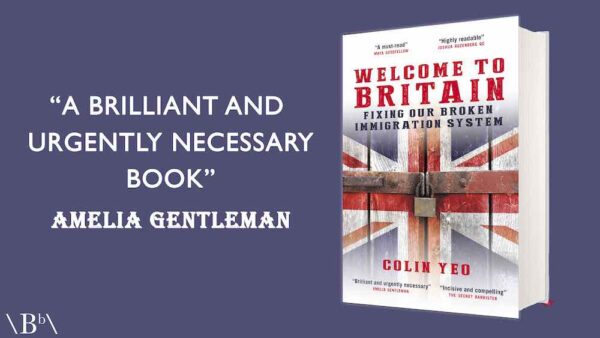By Alex Papasotiriou – Immigration Barrister
In Saleh Ahmed Handule Ali v Higher Tribunal (Immigration and Asylum Chamber) & Anor [2024] EWCA Civ 372 the Court docket of Enchantment confirmed in precept that the fitting to respect for an individual’s pre-existing personal life, developed while they had been within the UK, will be engaged by a refusal of entry clearance sought with the intention to return to the UK.
Factual Background
The appellant, a nationwide of Somalia, born on 1 July 1990, had entered the UK on 19 April 2000 together with his mom and two youthful siblings (and later an older sister) underneath the refugee household reunion Guidelines. They joined his father, who had been granted refugee standing the earlier 12 months. All members of the family had been granted indefinite go away to stay within the UK on the identical time, in 2004.
The appellant was issued with a UN Refugee Conference journey doc, legitimate from 2004 to 2014. In 2008, he was identified with tuberculosis and obtained remedy within the UK. On 1 December 2008, he travelled to Djibouti, whose hotter local weather would allow him to convalesce. His said intention was to remain there for a brief interval earlier than returning to the UK. Nonetheless, he misplaced his journey doc while in Djibouti in 2009. Within the absence of British consular help there, he travelled to Ethiopia and attended the British Embassy in Addis Ababa on 1 September 2009, with the intention to get hold of a brand new journey doc. Regardless of a minimum of two makes an attempt to hunt help and furnishing a photocopy of the misplaced journey doc, which his mom had despatched him in line with her proof, the Embassy refused to help him. The Embassy officers weren’t satisfied that the appellant had indefinite go away to stay within the UK and, it subsequently transpired, the Residence Workplace had didn’t preserve a document of the appellant’s indefinite go away to stay.
Consequently, the appellant remained in Ethiopia, undocumented and unable to return to the UK. Aside from his father, who left the household dwelling, his mom and siblings acquired British citizenship in his absence. The appellant’s solely possibility was to let his indefinite go away to stay lapse by an absence of greater than 2 years from the UK, earlier than making use of for entry clearance as a returning resident underneath (because it was then in power) paragraph 19 of the Immigration Guidelines. This turned attainable in precept from December 2010, though, because of the household’s restricted means, an entry clearance software was solely lodged on 2 Could 2015, at which level the appellant had been outdoors the UK for about 6 ½ years.
The appellant’s former solicitors set out the related information within the software, which was refused by the Entry Clearance Officer on 25 June 2015. The principle purpose for refusal was the alleged absence of proof of the appellant’s indefinite go away to stay within the UK and the choice failed to interact with the arguments superior when addressing the proportionality of the refusal; the appellant was handled as if he had remained outdoors the UK voluntarily. This resolution was not appealed. In 2017, with the help of her MP, the appellant’s mom was knowledgeable that the Residence Workplace had no document that the appellant had been granted indefinite go away to stay in 2004, even though all the opposite members had been granted indefinite go away to stay on the identical time and the appellant was subsequently issued with a journey doc. The appellant’s mom was instructed that she ought to have some paperwork in relation to the grant of indefinite go away to stay.
In January 2019, a brand new software for entry clearance was made on behalf of the appellant, as an grownup dependent relative. This software was refused and was appealed to the First-tier Tribunal, by which level the appellant’s personal life had grow to be a key function of the authorized argument, though initially the main focus was on his household life within the UK. It was argued that the refusal of re-entry, with the intention to resume his pre-existing life and ties to the UK, which had been fashioned over a big interval of his childhood, was a disproportionate interference with the appellant’s rights underneath artwork 8 of the European Conference on Human Rights, significantly as he had no means of creating a personal or household life in Ethiopia, the place he had no proper to reside.
The First-tier Tribunal Decide dismissed the appellant’s attraction on 28 October 2020. He was not glad that the appellant met the necessities of the grownup dependent relative class of the Guidelines, and thought of there have been no compelling circumstances warranting his admission on the premise of his household life, outdoors the Guidelines. The Decide didn’t proceed to contemplate the proportionality of any interference with the appellant’s personal life, as he had held himself certain by the choice in Abbas v Secretary of State for the Residence Division [2017] EWCA Civ 1393 to search out that the fitting to respect for the appellant’s personal life was not engaged by the refusal of entry clearance. This was however the truth that the scope of the choice in Abbas had not been raised or addressed within the refusal letter, the attraction supplies or the listening to itself, and that the Residence Workplace Presenting Officer’s argument was that the refusal of entry clearance was not disproportionate underneath artwork 8(2).
Permission to attraction to the Higher Tribunal was sought on behalf of the appellant, on the grounds that the First-tier Tribunal Decide had misinterpreted the choice in Abbas. It was pleaded that Abbas is authority for the proposition that artwork 8 doesn’t impose a optimistic obligation to grant entry clearance to a non-British citizen, to ensure that them to develop a personal life within the UK. Conversely, the appellant’s case was primarily based on interference with the personal life that he had beforehand developed when residing as a settled migrant within the UK. Permission to attraction was refused, with the grounds being described as not more than a disagreement with the findings and an try and reargue the attraction. There was no reference to Abbas or different authorities and the personal life declare was described as “not arguable”. While the Higher Tribunal’s resolution was promulgated on 1 August 2022, it was made on 24 Could 2022, and subsequently earlier than the restriction on the Cart jurisdiction of part 11A of the Tribunal Courts and Enforcement Act 2007 had come into power.
The appellant made a declare for judicial evaluate underneath the Cart jurisdiction, permission for which was refused by Lang J. An attraction towards that refusal reached the Court docket of Enchantment, following a grant of permission by Newey LJ.
Held
As recognized by Andrews LJ, with whose judgment Coulson LJ and King LJ agreed, the difficulty of precept raised within the attraction was whether or not the fitting to respect for personal life underneath artwork 8 is engaged when a resident non-national who was granted indefinite go away to stay, and whose journey doc has been misplaced or stolen while overseas, seeks re-entry to the UK to renew their life there. In addressing this subject and, by extension, whether or not the decrease courts had erred in regulation, Andrews LJ thought-about the ratio of Abbas.
Abbas was not involved with a situation through which the appellant had already established a personal life within the UK. The appellant was a Pakistani nationwide, residing in Pakistan, who had argued that the refusal of entry as a customer was a disproportionate interference together with his proper to develop a personal life within the UK. Andrews LJ confirmed her settlement with the ratio of Abbas that artwork 8 doesn’t oblige a state to permit a non-national to enter its territory with the intention to develop a personal life there. This precept is relevant to circumstances through which a non-national with out enough ties to the UK seeks entry with the intention to develop a personal life within the UK sooner or later. It’s not related to a state of affairs in regards to the refusal of re-entry after a brief absence to a settled migrant, such because the appellant in Ali, who, via no fault of his personal, is not in possession of the journey doc proving his immigration standing. The appellant was not searching for entry to develop a personal life, however to renew a pre-existing personal life within the UK ‘which had been curtailed for reasons beyond his control’.
No principled justification was discovered to exist for distinguishing between instances of expulsion, on one hand, and refusal of admission, on the opposite, the place they involved settled migrants with a longtime personal life within the UK. In Khan, while the Strasbourg Court docket declared the artwork 3 facet inadmissible for lack of jurisdictional competence, provided that the applicant was outdoors the UK, it held the artwork 8 declare to be manifestly unfounded, as the choice to cancel his go away was clearly proportionate. He had been within the UK on a pupil visa for lower than three years, earlier than he was arrested on suspicion of conspiracy to commit terrorist offences and voluntarily departed. Because the proportionality of the choice was assessed, artwork 8 had been sufficiently engaged. Sargsyan v Azerbaijan (2017) 64 EHRR 4 GC was additionally raised, the place the Strasbourg Court docket discovered that the personal life facet of artwork 8 was engaged in circumstances the place the applicant was denied entry to his former dwelling in Azerbaijan, the place he had developed most of his social ties and which he had been pressured to go away after it was annexed and have become a part of the Republic of Azerbaijan.
In sum, Andrews LJ held that ‘depending on the facts, the refusal of entry clearance could interfere with a person’s personal life developed within the UK sufficiently to interact Article 8, and Abbas doesn’t determine the opposite’. As he was a settled migrant, the refusal of re-entry to renew his personal life engaged the appellant’s proper to respect for his personal life underneath Article 8, and it was open to him to argue that this interference was disproportionate. The Court docket didn’t contemplate the place of a person whose personal life within the UK is of a extra tenuous nature, as that was not throughout the scope of the attraction.
For that reason, the Court docket held that the First-tier Tribunal Decide had materially erred in regulation by misinterpreting Abbas, and the Higher Tribunal Decide and Lang J had erred for failing to recognise this and for refusing permission to attraction and to proceed with the Cart judicial evaluate, respectively. The attraction was allowed and finally the case was remitted to the Higher Tribunal with the intention to assess the appellant’s personal life attraction on its deserves by figuring out whether or not the interference was disproportionate. While the query of proportionality was not a matter for the Court docket, Andrews LJ indicated an ‘obviously’ related consideration: ‘the extraordinary circumstances in which the appellant found himself unable to return within 2 years’.
Remark
Since Abbas was revealed in 2017 and till this judgment, seven years later, it was typically thought-about that the fitting to respect for personal life might by no means be engaged in entry clearance instances. It’s not clear why this false impression had arisen. As careworn by Andrews LJ, Abbas was strictly involved with whether or not there was a optimistic obligation underneath artwork 8 to permit entry to a non-national with the intention to pursue a personal life there. It was on this context that no settled line of authority by the Strasbourg Court docket had been recognized. Conversely, there may be Strasbourg authority confirming {that a} jurisdictional hyperlink may result from a pre-existing personal life within the Contracting State. At [109] of M.N. and Others v Belgium [2020] ECHR 930, the Strasbourg Court docket held:
- By the use of comparability, the Court docket emphasises that the above-cited instances are to be distinguished from these through which the information contained a global component however which didn’t contain extraterritoriality for the needs of Article 1 of the Conference. This was the state of affairs with regard to instances underneath Article 8 regarding selections taken with regard to people, regardless of whether or not they had been nationals, who had been outdoors the territory of the respondent State however through which the query of that State’s jurisdiction had not arisen, given {that a} jurisdictional hyperlink resulted from a pre‑present household or personal life that that State had an obligation to guard (see Nessa and Others v. Finland (dec.), no. 31862/02, 6 Could 2003; Orlandi and Others v. Italy, no. 26431/12, 14 December 2017; and Schembri v. Malta (dec.), no. 66297/13, 19 September 2017).
Within the previous paragraph, the Strasbourg Court docket distinguished such instances from the case of Khan, quoted by Andrews LJ in Ali, the place ‘in the absence of other criteria of attachment, the fact that the applicant had brought those proceedings was not sufficient to establish the United Kingdom’s jurisdiction with regard to the chance, alleged by the applicant, that he could be subjected in Pakistan to remedy opposite to Article 3 of the Conference’. While in Khan the artwork 3 declare was held incompatible ratione loci/personae [28], Strasbourg discovered the artwork 8 and 14 claims primarily based on the applicant’s exclusion from the UK to fall throughout the UK’s jurisdiction for the aim of artwork 1 [30]. As Andrews LJ said, Strasbourg’s discovering that the exclusion was clearly proportionate meant that artwork 8(1) on the premise of personal life, within the absence of household life, had been engaged.
It’s value noting that the Court docket of Enchantment’s judgment in Ali was solely attainable as a result of the Higher Tribunal’s resolution refusing permission to attraction was made on 24 Could 2022, previous to the approaching into power of s 11A of the Tribunal Courts and Enforcement Act 2007 on 14 July 2022, which restricted the Cart jurisdiction. By advantage of s 2(2) of the Judicial Assessment and Courts Act 2022, s 11A doesn’t apply to Higher Tribunal selections made earlier than the date on which it got here into power. Had the choice been made two months later, the appellant wouldn’t have had recourse to the Cart jurisdiction and his case wouldn’t have reached the Court docket of Enchantment because of this.
There will probably be instances, reminiscent of Ali, the place the First-tier and Higher Tribunal (even the Administrative Court docket, in Ali) might err on some extent of regulation of basic significance or with vital penalties for an appellant. Ali is a shining instance of the importance of the Cart jurisdiction, which, previous to its partial ouster, contained enough procedural, i.e. the second appeals take a look at, and substantive safeguards, specifically the upper courts’ deference to the specialist Tribunal, to make sure that it might carry out its necessary function successfully with out it being abused by claimants or leading to an extreme use of the courts’ sources. In gentle of Ali, maybe it will be wise for a brand new authorities to revisit the partial ouster of the Cart jurisdiction.
Contact our Immigration Barristers
For skilled recommendation and help with human rights appeals and judicial evaluate functions, contact our immigration barristers in London on 0203 617 9173 or full our enquiry kind under.








